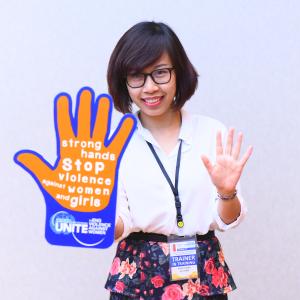UNICEF, UN WOMEN and MOLISA join hands to protect children and women in quarantine centres
03 May 2020
Ha Noi, 3 May 2020 – Thousands of children and women in quarantine centres across Viet Nam have been safeguarded through accelerated measures during the COVID-19 pandemic in a recent pioneering effort by the Government of Viet Nam, UNICEF and UN WOMEN.
“Children, adolescents and women are among the most vulnerable in any pandemic situation,” said Rana Flowers, UNICEF Viet Nam Representative, “In quarantine facilities, particularly, they face with prominent safety risks that must be addressed during their stay. These risks include accommodation safety, violence and sexual abuse, hygiene and nutrition safety and disclosure of personal information.” “This is a spearheading action of the Government of Viet Nam as part of its recognised strategies to fight the pandemic in the country.”
The effort saw tens of thousands of guidelines distributed to 392 quarantine centres across the country to provide their managers and staff with instructions for protection actions targeting children, adolescents and women. These covered safe living and proper hygiene conditions, provision of nutritional intakes, gender-sensitive security interventions to prevent violence and sexual abuse, psychological counselling as well as regulations on information safety among others. Tips on psychosocial wellbeing for children, adolescents have also been given to improve the quality of life in the facilities.
“In the fight against COVID-19, the Government of Viet Nam has put the lives of the people, including children and women first and foremost. When it comes to those in special circumstances such as in quarantine centres, the Ministry of Labour, Invalids and Social Affairs, UNICEF and UN WOMEN and other international organisations in Viet Nam have timely taken measures to meet specific needs of these groups,” stated Dang Hoa Nam, Director of the Children’s Affairs, Ministry of Labour, Invalids and Social Affairs (MOLISA). In these situations, he stressed, children and women need to be provided with information, skills, encouragement and full support.
Elisa Fernandez Saenz, UN Women Head of Office in Viet Nam reiterated, “The impact of the COVID-19 pandemic is not gender neutral, as it affects men and women differently. Therefore, we cannot be gender blind in our responses to the pandemic. We strongly encourage Ministry of Health, Ministry of Defense and local governments who are running quarantine facilities to make use of this guideline and put in place measures to ensure each quarantine centre is a safe place for women and children.” She adds that paying attention to women’s needs and leadership will strengthen COVID-19 response in Viet Nam.
According to MOLISA, during the social distancing period, the risks of violence and abuse towards children and women have remarkably increased nation-wide as they are both victims and witnesses of domestic violence. In April 2020 alone, the national child protection hotline 111 has received over 750 calls for assistance, of which over 200 needed interventions on domestic violence, abuse of children and trauma-related issues. In many countries around the globe, domestic violence has increased by at least 30 per cent.
The guidelines and communication materials have also been made available online on UNICEF, UN WOMEN and MOLISA’s websites and social media. There have been also numerous communication interventions on social media targeting children, adolescents and women to raise awareness and provide solutions since beginning of the pandemic. On mass media, the Government and these UN agencies have held various talks to draw public attention to protect the most vulnerable groups.
###
Download the guidelines for the safety of children and women in quarantine centers in Vietnamese here and in English here.
Tips for children and adolescents in quarantine centers in Vietnamese here and in English here.
For more information, please contact:
- Louis Vigneault-Dubois, UNICEF Việt Nam +84-24-38500241; +84-966539673; email : lvigneault@unicef.org
- Nguyễn Thị Thanh Hương, UNICEF Việt Nam, 84-24-38500225; +84-904154678; email: ntthuong@unicef.org
- Hoàng Bích Thảo, UN WOMEN Việt Nam, +84-24-38500376; email : hoang.thao@unwomen.org



